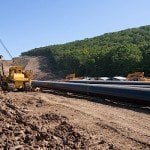While 5G is technically already around, a widespread release across the world will not be seen until late 2019 or early 2020. The first places we will start to see 5G develop is in major cities, where the potential for such an efficient and fast wireless network is almost unthinkable.
Many people associate 5G, like 4G and 3G before it, with mobile phone internet connection, allowing people to surf the net on the go. However, 5G is so much more than that. 5G is the technological masterpiece that could be set to catapult our cities of yesterday into the smart cities of tomorrow.

5G boasts incredibly high speeds and improve latency and reliability, as well as being an extremely economical tool. The new wireless tech means that cheap radio sensors can be placed in just about any object around the city to increase their functions by linking them up to real-time wireless networks. Cities and companies are expected to come together to develop the technology and various uses and applications for the technology for wide improvements that will benefit all.
So, how does 5G apply to elements of a smart city?
Healthcare – 5G connections allow ambulances to gain instantaneous information from the treated patient. Not only does this allow the paramedics within the vehicle to use the data and treat accordingly, but it also means that the hospital will already have the info upon arrival. Doctors and surgeons will be given more time to prepare for patients’ arrivals, thus increasing the efficiency of the emergency healthcare system as a whole.
Transport – 5G could be just the ticket to advance autonomous public transport, from rail travel to buses and much more. The network technology can also allows for sensors to be installed into the street to record real-time public data. This allows the government to look at travel patterns in order to improve the state of traffic in the city.
- Traffic Lights – 5G can able traffic lights to change colour based on real-time events and conditions.
- Police – Traffic cameras can have a fast and direct connection straight to police stations. This cuts down on the delay between the footage being recorded and the police viewing it.
- Noise – Sensors can be used to record the levels of noise in the city.
- Waste – Sensors can be deployed to record information on waste in the city. This could allow the city to make any relevant changes to the waste disposal system, recycling, and more.
- Energy – Sensors can be installed to record energy outputs across the city. This could allow the city to monitor how much renewable energy is being used, as well as helping to suggest ways in which consumption can be improve.
5G is clearly going to change smart cities for ever, it’s just a matter of how and when.






























